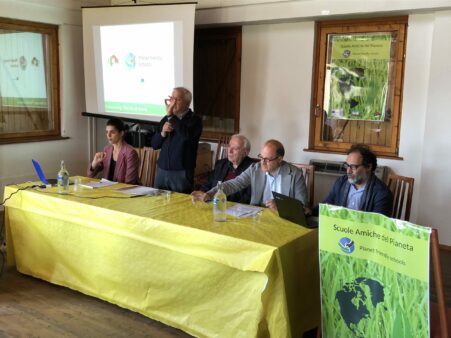A non-ritual Earth Day celebration took place yesterday 22 April in Piticchio di Arcevia (AN), at the La Terra e il Cielo cooperative. The Terreno Fertile (Fertile Earth) initiative, promoted by the Centro Libero Analisi e Ricerca ETS (ETS Free Analysis and Research Centre), in collaboration with the historic reality of Italian organic farming, was able to bring together not only ideas and ideals but also concrete initiatives, offering an opportunity for a passionate and participatory dialogue on the future of our societies.
In one of the most beautiful areas of Central Italy, on the edge of the Apennines, the finally spring-like atmosphere was the right one to address the interweaving of operational choices that, born from the world of organic farming, are now developed at 360° for the protection of the agricultural heritage, landscape, traditions and culture of our lands: training and education, soil fertility, food quality and wholesomeness, fair organisation of supply chains, fair price to producers, technical improvement, commercial strategies.
Bruno Sebastianelli, president of the La Terra e il Cielo Cooperative, opened the proceedings by recalling with effective simplicity, briefly but punctually, the long battle fought in over forty years by the cooperative to affirm good organic farming on national and foreign markets, i.e. production and processing that must not only defend the fertility of its soil and provide healthy food, but also ensure, against all speculation, the fair remuneration of the agricultural producer.
Municipal councillor Martina Mencarelli, representing the mayor of Arcevia (AN), engaged in the inauguration of the Ciclo Appenninica Alte Marche (CAAM), expressed the municipality’s support for this type of initiative, emphasising the importance of a growth in awareness, especially on the part of young people, concluding with the poet Franco Arminio’s call to ‘gather ourselves and look at the things and creatures around us’.
Luca Serafini, president of CLAR ETS, briefly explained the activities of the association, which has been active since 1996 in various fields, including professional training and social work: a wide range of activities all oriented towards the spiritual growth of the human being. He then passed the floor to Elena Sinatti who, referring to the theme of knowledge and individual awareness as decisive factors in tackling sustainability issues, presented the EU Erasmus Plus project, Planet Friendly Schools, for which CLAR ETS is responsible for Italy. A project that brings together more than 90 of the best training-educational practices on the theme of the sustainability of the environment, food and agricultural production: practices aimed in particular at children, young people and youth, selected in the 10 European partner countries of the project and made available to educators, teachers and trainers on the planetfriendlyschools.eu website of the same name.
It was then the turn of Prof. Francesco Luca Basile, professor at the University of Bologna, who illustrated, as a member of its scientific committee, the activities of the Rete Humus: a meeting and interaction point for over 500 Italian producer-processor and consumer organisations, with more than 7000 ha involved, whose project is fundamentally based on four objectives: sustainable development; fair price; responsibility towards the territory and society; goodness of food. Prof. Basile emphasised the importance and risks that current agriculture (which contributes as much as 30% of total emissions) runs in terms of reducing fertility and primary production, if innovations such as organic farming are not adopted. He then summarised the data contained in the very recent IPCC (Intergovernmental Panel on Climate Change) report, which also contains fundamental indications for the agricultural sector. In conclusion, he referred to the economics of the doughnut, elaborated by British scholar Kate Raworth, which identifies the close interactions and limits resulting from the integration of economic activities and environmental resources.
To complete the perimeter of the fertile soil, which is certainly not just a physical fact, prof. Antimo Zazzeroni, president of the prestigious Institute of Natural Medicine in Urbino (PU), highlighted, thanks also to the scientific contributions of epigenetics, the importance of proper nutrition for psycho-physical health, as a condition of balance, which the economy of speculation and consumerism has been threatening for some time, both on an individual and collective level, as demonstrated by the senseless use of glyphosate, the spread of food intolerances, and even celiac disease. From his point of view too, there are therefore many factors that demonstrate the validity of organic farming as a source of healthy food and at the same time a guardian and valoriser of the natural environment.
In the debate that concluded the morning’s work, together with technicians and producers, among others, the president of the association of companies in the Misa and Cesano Valleys, GioMarche, the entrepreneur Riccardo Montesi, took the floor. He put forward the proposal that the workers of member companies could order and receive their organic products weekly from the cooperative La Terra e il Cielo. The mayor of Urbino, Maurizio Gambini, here in his capacity as farmer and president of the Terrabio producers’ cooperative, intervened to inform of the agreement between his cooperative and La Terra e il Cielo, for a shared marketing of some of its products, emphasising that many of the sector’s current critical issues can be addressed by improving field techniques and also by commercial agreements and understandings that organise supply, bringing it closer to the end consumer.


